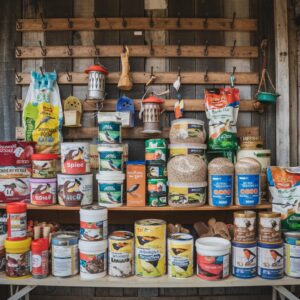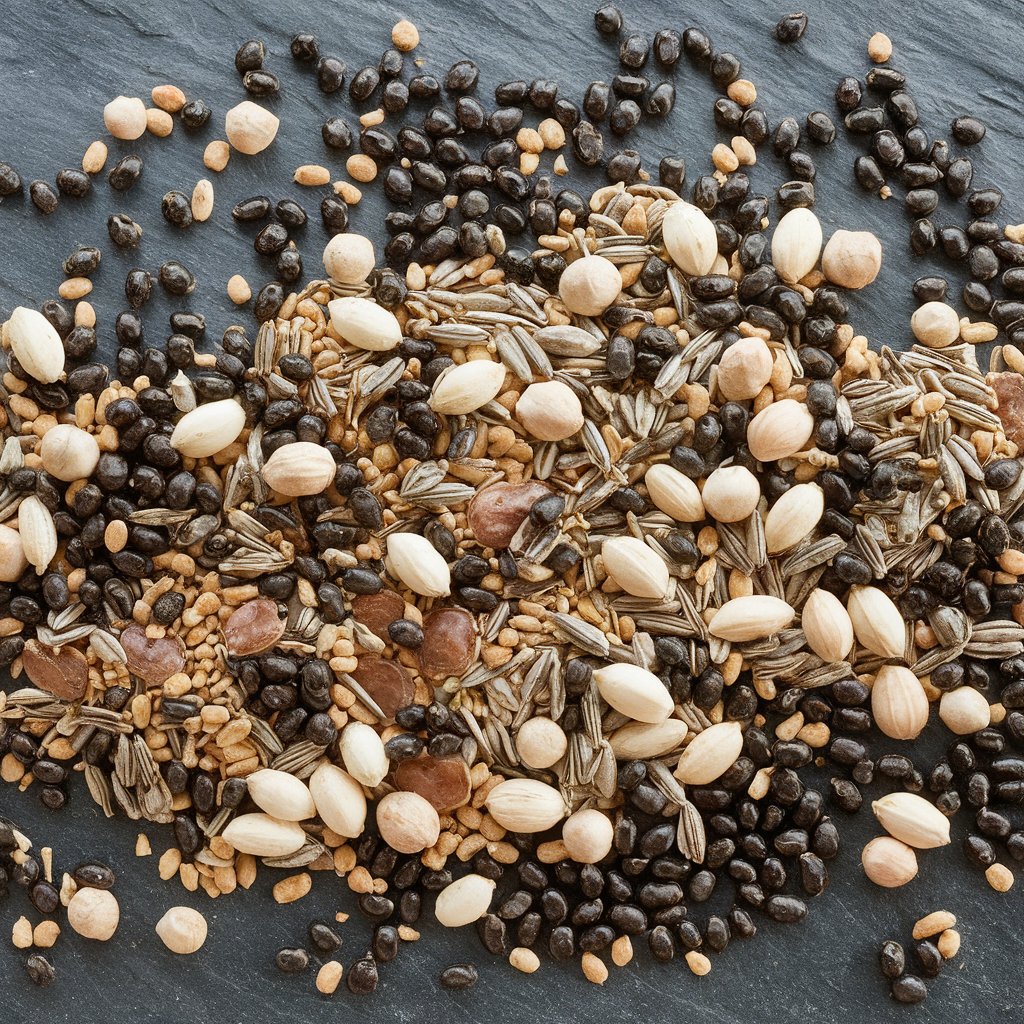Introduction to Bird Seed Food
Birdwatching has grown in popularity, with many people setting up backyard feeders to attract birds and enjoy their colorful presence. A vital part of this hobby is choosing the right bird seed food to entice various species. Whether you’re a beginner or a seasoned birdwatcher, understanding which seeds work best is essential.
Selecting the appropriate seed mix isn’t just about attracting birds; it also affects their health and nutrition. Feeding wild birds can support their survival, especially during harsh seasons like winter. Properly chosen birdseed food offers a balanced diet of fats, proteins, and essential nutrients, ensuring birds thrive in your yard.
For more in-depth guidelines on bird feeding, you can visit How to Prevent Moths in Bird Seed Naturally and learn from their expert tips.
Types of Bird Seed Food and Their Benefits
Black oil sunflower seeds are one of the most popular choices for bird feeders. These seeds are high in fat, making them an excellent energy source for birds like cardinals, chickadees, and finches. Their thin shells are easy for most birds to crack open, making them a go-to option for backyard feeders. As a result, these seeds are ideal for attracting a wide variety of species, especially during colder months when birds need extra energy.

Nyjer Seeds (Thistle Seeds)
Loved by small finches, nyjer seeds (often called thistle seeds) are tiny, high-oil seeds perfect for attracting goldfinches, pine siskins, and other small songbirds. These seeds are usually placed in specialized mesh feeders that prevent larger birds from accessing them.
The All About Birds resource highlights that nyjer seeds are heat-treated to prevent the spread of invasive plants, making them environmentally friendly and an excellent option for targeted feeding.
White Proso Millet
White proso millet is another excellent seed for backyard feeders, particularly for ground-feeding birds like sparrows, juncos, and mourning doves. This tiny, round seed is a staple in many bird seed mixes but should be used cautiously as it can also attract less desirable species such as blackbirds and house sparrows.
Safflower Seeds
Safflower seeds are beautiful to birds like cardinals and grosbeaks. Their hard shells make them less appealing to squirrels and unwanted bird species, like house sparrows and starlings. Offering safflower seeds is an excellent way to minimize waste and keep your feeder focused on attracting your desired birds.
Peanuts
Peanuts are a high-protein, high-energy option for birds like jays and woodpeckers. However, they should be stored in dry, sealed containers to avoid mold and spoilage, as damp peanuts can pose health risks to birds.
Selecting Bird Seed Mixes for Different Species
Seed Blends for a Variety of Birds
If you want to attract a diverse array of birds, using seed blends is an intelligent choice. These blends typically contain black oil sunflower seeds, millet, and cracked corn, creating a mix that appeals to various species, from sparrows to woodpeckers.
Sources like Business Insider and Love The Birds recommend birdseed food blends that contain high-quality ingredients without fillers.
Specialized Blends (e.g., Songbird Mixes)
Specialized blends, such as songbird mixes, are great for those looking to attract specific birds. These mixes often contain nyjer seeds and safflower, tailored to appeal to smaller birds while minimizing waste and avoiding larger pests.
DIY Bird Seed Mixes
If you prefer to tailor your feeding strategy, creating your birdseed food mix can be fun and effective. Combine ingredients like black oil sunflower seeds, millet, and peanuts based on the species you want to attract.
Factors to Consider When Choosing Bird Seed Food

Nutritional Value
Ensuring your bird seed food provides a balanced diet is crucial for bird health. Birds require a mix of fats, proteins, and carbohydrates. For example, black oil sunflower seeds provide essential fats, while millet offers necessary carbohydrates.
Feeder Compatibility
Different bird seed types work better in specific feeders. For instance, tube feeders are ideal for nyjer seeds, while tray feeders work well for black oil sunflower seeds and peanuts. The type of feeder you choose can also determine which birds visit your yard.
Seasonal Bird Feeding Tips
Bird seed preferences change with the seasons. In winter, birds require high-fat foods like peanuts and black oil sunflower seeds to maintain their energy levels. In contrast, birds need protein-rich seeds like millet to support nesting and molting during spring and summer.
Common Problems with Bird Seed Food
Spoilage and Mold Prevention
Birds seed can spoil quickly in damp conditions, leading to mold growth. Ensure your feeders are kept dry and provide only as much seed as the birds can eat in a day or two.
Avoid Filler Seeds
Avoid mixes that contain fillers like red millet and corn, as many birds won’t eat these, leading to waste. Instead, invest in high-quality birdseed food without unnecessary additives.
FAQs About Bird Seed Food
- What is the best bird seed for cardinals?
Black oil sunflower and safflower seeds are top choices for attracting cardinals. - What bird seeds should I avoid?
Avoid filler seeds like oats, flax, and red millet. Birds often discard these, leading to waste. - Can birds eat peanuts?
Peanuts are a favorite of jays and woodpeckers but should be unsalted and stored correctly to prevent spoilage. - Do birds prefer seed mixes or single seeds?
Seed mixes attract a variety of species, while single seeds, like black oil sunflower, are ideal for targeted feeding. - What is the shelf life of bird seed?
Keep seeds in dry, airtight containers to extend freshness.

